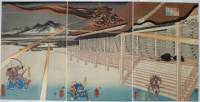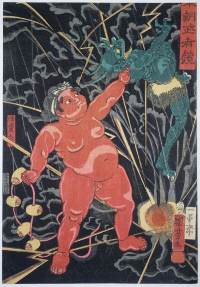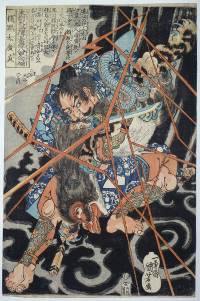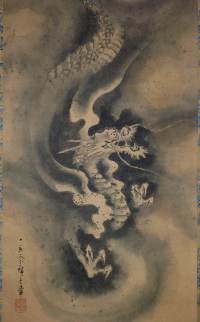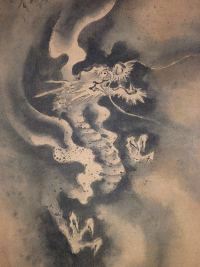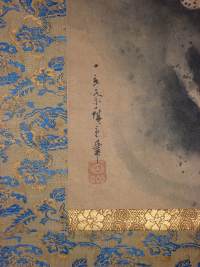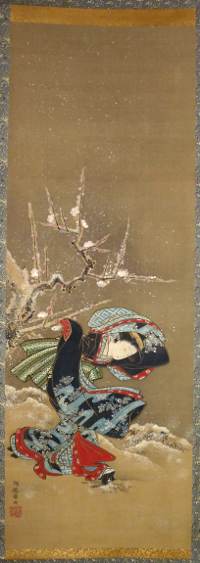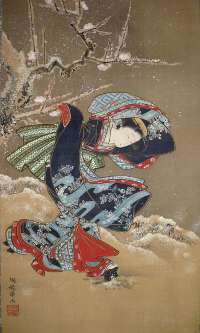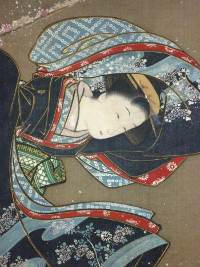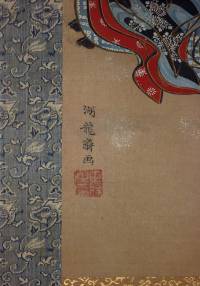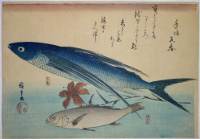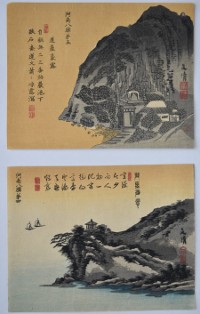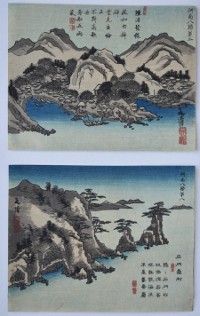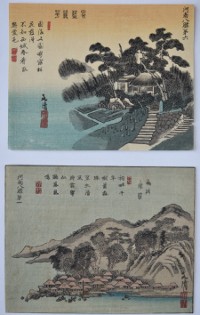/category/archive/page/5/
Utagawa KUNIYOSHI (1797-1861)
Click here to view image full size.
A triptych Akazawa-yama o-sumo showing the most famous sumo match in Japanese history between Kawazu Saburo Sukeyasu and Matano Goro Kagehisa at Akazawa mountain. Also famous as Kawazu used a new sumo hold wrapping a foot around his opponent’s leg and encircling the neck with one arm, a manoeuvre that became known as the Kawazu hold. The event took place in 1176 before Shogun Minamoto Yoritomo where Kawazu defeats the popular bully Matano. Subsequently Kawazu was murdered, quite unrelated to the bout. His sons swear revenge and their story becomes the Soga monogatari. Kawazu is shown here throwing Matano to the ground, the referee to the left. Published 1858 by Maruya Kyushiro. Robinson T353. Provenance: Purchased from me in 1994.
Superb impression and colour. One small thinned area, otherwise very fine condition. Probably the finest impression extant of this famous design. Signed Kuniyoshi ga and Ichiyusai Kuniyoshi ga.
Status: Sold
Utagawa KUNIYOSHI (1797-1861)
Click here to view image full size.
A triptych showing the famous archer Minamoto no Yorimasa preparing to shoot the monster Nue on the roof of the Shishinden Palace. The story relates how in 1153 the sixteen year old Emperor Konoe was having difficulty sleeping due to the shrieks and scratchings emanating from the palace roof. Guards informed him that a black cloud descended there every night. Yorimasa was called upon to investigate and he brought down the beast – a composite creature, part monkey, badger, tiger, dragon and snake which was duly despatched by his retainer Hironao no Hayata (Tadazumi no Hayata). Subsequently Konoe sleeps soundly and rewards Yorimasa with a fine sword and a court beauty Yorimasa loves. An exceptional design published 1842-3 by Yamashiroya Shinroku. Robinson T112. Provenance: Purchased from me in 1994.
Fine impression, colour and condition. Signed Ichiyusai Kuniyoshi ga.
Status: Sold
Utagawa KUNIYOSHI (1797-1861)
Click here to view image full size.
Kwaido Maru (Kintoki) seizes Raijin, the Thunder God, with one hand while holding his thunder drums with the other. A thunderbolt falls to earth causing flashes of lightning. A fine and rare set: Honcho musha kagami, “Mirror of Warriors of our Country.” The set published by Tsujioka-ya Bunsuke, 1855. Robinson S87.6.
Fine impression. Slightly trimmed, otherwise very good condition. Signed Ichiyusai Kuniyoshi ga.
Status: Sold
Utagawa KUNIYOSHI (1797-1861)
Click here to view image full size.
Hironao no Hayata (Tadazumi no Hayata), Yorimasa’s retainer (see the triptych by Kuniyoshi of the same subject on this update), grappling with the composite beast Nue on the roof of the Shishinden Palace. Forked lightning bounces around him. One of the best designs from Honcho Suikoden goyu happyaku-nin no hitori, “Eight Hundred Heroes of our Country’s Suikoden, One by One.” Published by Kagaya Kichiemon, 1830-31.
Very good impression and colour. Slight trimming, otherwise very good condition. Signed Ichiyusai Kuniyoshi ga.
Status: Sold
Ichiryusai HIROSHIGE (1797-1858)
Click here to view image full size.
A newly discovered painting of a three-clawed Kano-style dragon amongst clouds. Although a subject popular with Japanese artists (and especially Chinese artists where the subject derives from), this appears to be the only such painting by Hiroshige extant. He did, however, produce two prints of the subject – a surimono and a large panel, both of around the same date. The signature indicates a date after 1840 and it was most likely painted for the Dragon Year 1844. Blue and brown ink on paper with extensive splashed ink. Image size 34.5 x 10.5 in; 87.7 x 26.7 cm. The mount uses a ryu-mon (dragon pattern) motif to match the subject. Very good condition. Signed Ichiryusai Hiroshige hitsu with Ichiryusai seal.
Status: Sold
Isoda KORYUSAI (FL c 1764-1788)
Click here to view image full size.
A superb original painting, full colour on silk, showing a beauty running in a late snowfall. Cherry blossom above. A leading artist of his time who produced some of the best bijin and kacho prints of the 1770s before concentrating on painting. Image size 40.25 x 14.25 in; 102.5 x 36 cm. Good condition. Painted c 1778. Signed Koryusai ga with seal Masakatsu, no in.
Status: Sold
Utagawa HIROSHIGE (1797-1858)
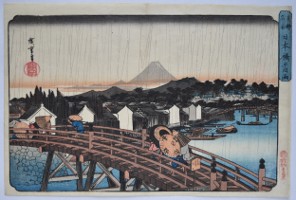
Click here to view image full size.
Nihonbashi no hakuu, “Light Rain on Nihon Bridge.” From a Toto meisho set of 21 designs published between c. 1832 and 1839 by Kikakudo. The set was subsequently enlarged. Shows figures crossing Nihonbashi in rain, one figure carries an umbrella with the publisher’s name. Warehouses in the background and a distant view of Fuji. A beautiful print and very difficult to find in early impression: The title cartouche had a plug inserted beside the bottom three characters of the title on the left. This damage seems to have occurred when the block was cut and over time the spigot gradually slipped out leaving an unprinted area (which is sometimes painted in). In the earliest impressions the plug is hardly visible (as here). Also, the publisher’s seal at the bottom right should be in red, later editions having it in black. There was also an early variant edition with a yellow sky.
Fine impression and colour. Imperceptible centre fold, also near the right edge, otherwise very good condition. Signed Hiroshige ga.
Status: Sold
Utagawa HIROSHIGE (1797-1858)
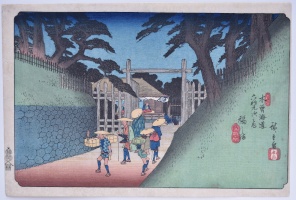
Click here to view image full size.
Station Fukushima from Kisokaido rokujukyutsugi no uchi, “Sixty-nine Stations of the Kisokaido.” The set of seventy prints was started by Eisen and published by Hoeido in 1835, but in 1837 Hiroshige took over and completed the series with the publisher Iseya Rihei (Kinjudo). Fukushima was one of the four most important checkpoints in the country and travellers had to have their documents inspected and approved before they could continue.
Superb impression. Very fine colour. Fine condition. Signed Hiroshige ga.
Status: Sold
Utagawa HIROSHIGE (1797-1858)
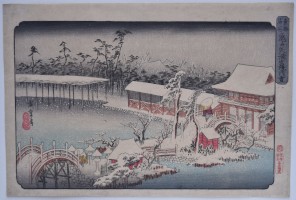
Click here to view image full size.
Kameido Tenmangu keidai no yuki, “The Compound of the Tenman Shrine at Kameido in Snow.” From a set of twenty-one prints Toto meisho, “Famous Views in the Eastern Capital” published by Sanoya Kihei, c 1834-5. The series was extended to fifty-five in c 1839-42. One of the most famous places in Edo. Known for its pergola, two drum bridges, koi ponds and the wisteria which flowered in the fifth month. The main shrine is dedicated to the memory of Sugawara no Michizane (Tenjin), the father of Japanese learning and built in 1662. The design comes in various states: Late editions have a black sky and the red publisher’s seal on right margin is replaced with an abbreviated Sanoki seal in black. Even later editions show a slipping plug becoming evident on the edge of the water, centre left.
Fine, very early impression with the double-printing on the cloak of the figure on the bridge. Fine colour and condition. Signed Hiroshige ga.
Status: Sold
Utagawa HIROSHIGE (1797-1858)
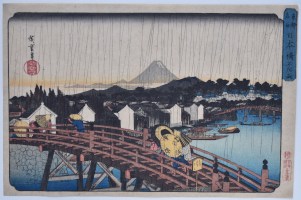
Click here to view image full size.
Nihonbashi no hakuu, “Light Rain on Nihon Bridge.” From a set of twenty-one prints Toto meisho, “Famous Views in the Eastern Capital” published by Sanoya Kihei, c 1834-5. The series was extended to fifty-five in c 1839-42. Shows figures crossing Nihonbashi in rain, one figure carries an umbrella with the publisher’s name. Warehouses in the background and a distant view of Fuji. A beautiful print and difficult to find in early state: The title cartouche had a plug inserted beside the bottom three characters of the title. This damage seems to have occurred when the block was cut and over time the spigot gradually slipped out leaving an unprinted area (which is sometimes painted in). In the earliest impressions the plug is not visible, as here. Also, the publisher’s seal at the bottom right should be red, later editions having it in black.
Fine, very early impression with a pale yellow sky. Fine colour and condition. Signed Hiroshige ga.
Status: Sold
Utagawa HIROSHIGE (1797-1858)
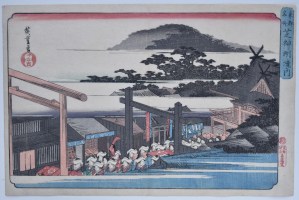
Click here to view image full size.
A procession at the Shiba Shinmei keidai, “Precincts [of the] Shiba Shinmei [Shrine].” The shrine with the distinctive chigi protruding roof beams can be seen on the right. A popular area with the Zozoji Temple, tea stalls and where the Shoga Matsuri Festival was held. From a set of twenty-one prints Toto meisho, “Famous Views in the Eastern Capital” published by Sanoya Kihei, c 1834-5. The series was extended to fifty-five in c 1839-42.
Fine, very early impression. The publisher’s seal at the bottom right should be red, later editions having it in black. Fine colour. Slight centre fold, otherwise very good condition. Signed Hiroshige ga.
Status: Sold
Ichiryusai HIROSHIGE (1797-1858)
Click here to view image full size.
Tobiuo, flying fish (probably Prognichthys) and ishimochi also called guchi or shiroguchi, white croaker, (probably Argyrosomus argenatus). Together with a single lily. Poem by Toshigaki Maharu. From the second series of ten fish prints published by Yamasho, c1840-42.The first series was issued privately for a poetry group ( probably the Shingyoku Circle ) with judges’ names and extra poems. These prints are of the utmost rarity as probably only enough for the Circle were printed and they never come onto the market. Due to their popularity this first series was published commercially and a second set was commissioned.
Fine, early impression with mica on the flying fish. Fine colour and condition. Full size and no centre fold. Signed Hiroshige ga in blue (which I have never seen).
Status: Sold
Ichiryusai HIROSHIGE (1797-1858)
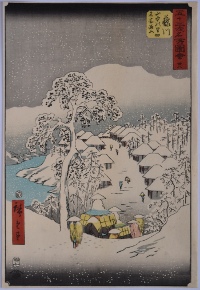
Click here to view image full size.
Fujikawa from the so-called “Upright Tokaido.” One of the two snow scenes from the set. Shows travelers coming and going at the edge of the village. Published by Tsutaya, Hare 7, 1855.
Very good impression with wood-grain evident in the sky. Very good colour. Trimmed close, otherwise very good condition. Signed Hiroshige ga.
Status: Sold
Utagawa HIROSHIGE (1797-1858)
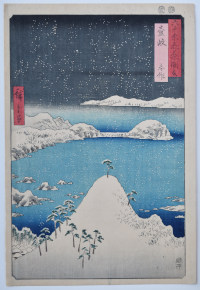
Click here to view image full size.
Iki Shisaku, “Shisaku in Iki [Province]” from a set of 69 prints [Dai Nihon] Rokujuyoshi meisho zue, “Famous Places in the Sixty-odd Provinces [of Japan]” published by Koshihei between 1853 and 1856, this being 1856. A heavy snowfall over Iki island which lies to the northeast of the Kyushu coast in southern Japan.
Very fine impression and colour. Light album backing, otherwise fine condition. Signed Hiroshige ga.
Status: Sold
Utagawa HIROSHIGE (1797-1858)
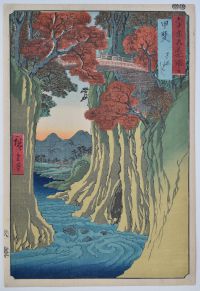
Click here to view image full size.
Kai, Saruhashi, “Kai [Province], Monkey Bridge” from a set of 69 prints [Dai Nihon] Rokujuyoshi meisho zue, “Famous Places in the Sixty-odd Provinces [of Japan]” published by Koshihei between 1853 and 1856, this being 1853. The bridge spans the Katsura River and is an example of the hanebashi method of construction whereby cantilever beams are set in the opposing cliff faces. Called the Monkey Bridge because monkeys are originally supposed to have strung themselves across the gorge.
Very fine impression and colour. Light album backing, otherwise fine condition. Signed Hiroshige ga.
Status: Sold
Utagawa HIROSHIGE (1797-1858)
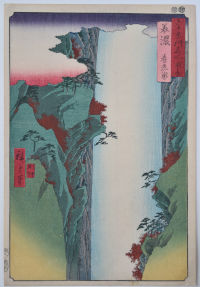
Click here to view image full size.
Mino, Yoro no taki, “Mino [Province], Yoro Waterfall” from a set of 69 prints [Dai Nihon] Rokujuyoshi meisho zue, “Famous Places in the Sixty-odd Provinces [of Japan]” published by Koshihei between 1853 and 1856, this being 1853. The 32 metre fall is 4 metres wide and is located in Yoro Park, near Nagoya.
Very fine impression and colour with blind-printing on the fall. Light album backing, otherwise fine condition. Signed Hiroshige ga.
Status: Sold
Utagawa HIROSHIGE (1797-1858)
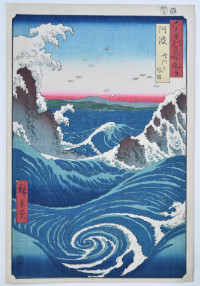
Click here to view image full size.
Awa, Naruto no fuha, Naruto Whirlpools, Awa [Province]” from a set of 69 prints [Dai Nihon] Rokujuyoshi meisho zue, “Famous Places in the Sixty-odd Provinces [of Japan]” published by Koshihei between 1853 and 1856, this being 1855. The finest print from the set and one of Hiroshige’s most important designs. The phenomenon is caused by the tides that move large amounts of water through the Naruto Strait into and out of the Inland Sea.
Very fine impression and colour. Light album backing, otherwise fine condition. Signed Hiroshige ga.
Status: Sold
Utagawa HIROSHIGE (1797-1858)
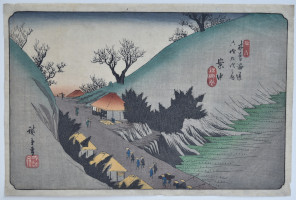
Click here to view image full size.
Station Annaka from Kisokaido rokujukyutsugi no uchi, “Sixty-Nine Stations of the Kisokaido.” Published by Kinjudo, the set was started by Eisen in 1835 who designed twenty-four prints before Hiroshige replaced him and completed the set before 1843. Shows the entourage of a feudal lord progressing along the road between rest houses.
Very fine impression of the earliest printing. Fine colour and condition. Signed Hiroshige ga.
Status: Sold
Katsushika HOKUSAI (1760-1849)
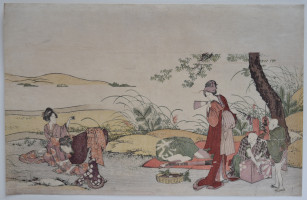
Click here to view image full size.
A group of three women picking mushrooms. Published c 1800. Another impression, from the Musee Guimet, is illustrated in Muneshige Narazaki, Ukiyo-e Masterpieces in European Collections, 6, Musee Guimet, Paris, 1, p. 176, no. 90.
Fine impression. Very good colour and condition. Unsigned.
Status: Sold
Utagawa HIROSHIGE (1797-1858)
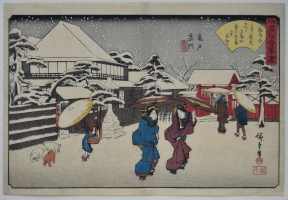
Click here to view image full size.
A snow scene from a set Edo komei kaitei zukushi, “Famous Teahouses of Edo,” Kameido uramon, Tamaya, “Back Gate of the Shrine at Kameido: The Tamaya Teahouse.” The set published by Shogendo, 1838-40.
Very fine impression. Fine colour. Slight centre fold (strengthened au verso), otherwise very good condition. Signed Hiroshige ga.
Status: Sold
Utagawa HIROSHIGE II (1826-1869)
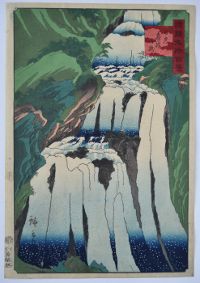
Click here to view image full size.
Nikko Shimofuri no taki, “Shimofuri Waterfall in Nikko” from Shokoku meisho hyakkei, the “Hundred Views of Famous Places in the Provinces.” An uncompleted set of 81 prints published by Uoya Eikichi between 1859-1861 (this being 1859).
Very fine impression of the first edition. Fine colour and condition. Signed Hiroshige ga.
Status: Sold
Utagawa HIROSHIGE II (1826-1869)
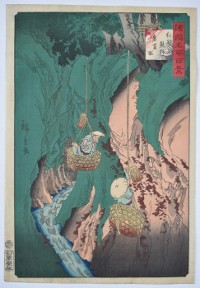
Click here to view image full size.
Gathering iwatake, rock tripe or rock mushrooms in Kii Province. The common name for various edible lichens that grow on cliffs. The gatherers used precarious baskets that were hauled up and down the cliff face to collect them. Kishu Kumano iwatake tori from Shokoku meisho hyakkei. “Hundred Views of Famous Places in the Provinces.” Published by Uoyei 1859-1861 (this being 1860).
Very fine impression of the first edition. Fine colour and condition. Signed Hiroshige ga.
Status: Sold
BUNSEI (Active c. 1830 -1844)
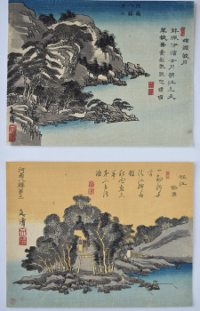
Click here to view image full size.
A complete set of Eight Views of Xiaoxiang, modern Hunan Province, China. These eight views were taken up by Japanese artists such as Hiroshige and transposed to Japan becoming sets like the Eight Views of Omi, etc. Bunsei was a pupil of Tani Buncho. He seems to have made a speciality of this subject and there is a slightly larger version set of the same subject. Published c. 1830s. Provenance: Ex Hayashi with his seal on most of the designs. Rare complete.
Very good impressions and colour. Minor edge wormage, othwerwise very good condition. Each signed Bunsei.
Status: Sold
Utagawa HIROSHIGE (1797-1858)
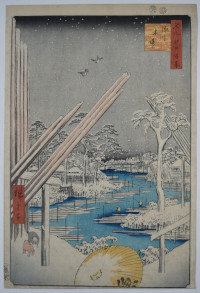
Click here to view image full size.
The lumberyard, Fukugawa, from the set Meisho Edo hyakkei, “One Hundred Views of Edo.” The set published by Uoya Eikichi 1856-58 (this being 1856). The set comprises 118 prints by Hiroshige and another by Hiroshige II. However, three prints are dated 10/1858, the month following Hiroshige’s death and these are thought to be by Hiroshige II as well. They are: Ueno Yamashita, Ichigaya Hachiman and Bikunibashi. Shows snow falling on the timber yards lining a river. An umbrella in the foreground is inscribed Uo, “Fish” – a reference to the publisher Uoya Eikichi. A large supply of timber was needed for the world’s largest wooden city. However, in 1641 a fire destroyed not only houses but the lumber which was then stored in a central area forcing the government to move the yards to Fukugawa.
Very good, early impression. Very good colour. Trimmed close at bottom. Otherwise very good condition. Signed Hiroshige ga.
Status: Sold
Utagawa HIROSHIGE (1797-1858)
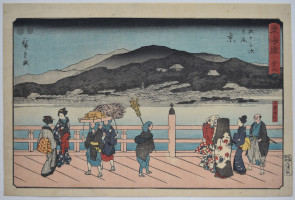
Click here to view image full size.
The great Sanjo Bridge, Kyoto. Number 55 from the Tokaido: Gojusantsugi published by Marusei, c 1848-49. Also known as the Reisho Tokaido. Shows figures on the bridge including Oharame carrying firewood and ladies with katsugi garments. In the distance is Higashiyama and Mt. Hiei.
Fine impression, colour and condition. Signed Hiroshige ga.
Status: Sold
Utagawa HIROSHIGE II (1829-1869)
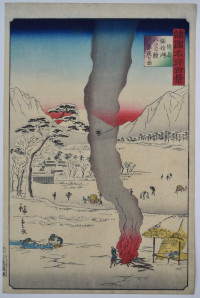
Click here to view image full size.
Shinshu Suwa-ko yatsume akauo wo to (ru). Shinshu (Shinano) Province from Shokoku meisho hyakkei, “Hundred Views of Famous Places in the Provinces.” An uncompleted set of 81 prints published by Uoya Eikichi between 1859-1861 (this being 1860). A winter scene showing figures catching lampreys, eels and red rockfish in Lake Suwa. The lake was unusual in having warm currents beneath the ice, even in mid winter.
Fine impression of first edition. Fine colour and condition. Signed Hiroshige ga.
Status: Sold
Utagawa KUNIYOSHI (1797-1861)
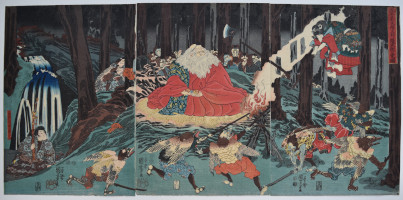
Click here to view image full size.
A triptych showing Ushiwaka Maru (Minamoto no Yoshitsune’s childhood name), attended by Kisanda, practising fencing with the karasu or “crow” tengu in a forest glade on Mt. Kurama, north of Kyoto. His training in martial arts is being supervised by a white-bearded yamabushi tengu, Sojobo, King of the Tengu. (The yamabushi were followers of Shugendo– a shamanistic mountain ascetism.) Yoshitsune (1159-1189) is the best known Japanese warrior and a popular subject for Japanese artists and craftsmen. Famous for exploits such as the battle on Gojo Bridge with Benkei and the battle of Dan-no-ura. Published by Enshuya Hikobei, 1851-2. Robinson T264.
Fine impression. This is the first state with gradation on the rocks top left. Fine colour. Very good condition. Signed Ichiyusai Kuniyoshi ga.
Status: Sold
Ichiryusai HIROSHIGE (1797-1858)
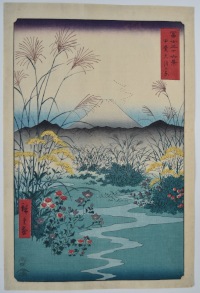
Click here to view image full size.
Kai Otsuki no hara, “Otsuki [“Great Moon”] Plain in Kai Province.” The most popular print from Fuji sanjurokkei, “The Thirty-six Views of Fuji.”Published by Tsutaya Kichizo, 4/1858. A distant view of Fuji with a stream meandering amongst wild flowers. Some of them are from the Seven Herbs (Nanakusa) of Autumn, being: pampas grass, susuki, yellow patrinia, ominaeshi, bellflowers, kikyo, and wild carnations, tokonatsu.
Fine impression, colour and condition. Signed Hiroshige ga.
Status: Sold
Ichiryusai HIROSHIGE (1797-1858)
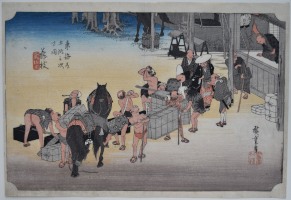
Click here to view image full size.
Fujieda from Tokaido gojusan tsugi, “The Fifty-three Stations of the Tokaido.” The set of fifty-five prints was published jointly by Hoeido and Senkakdo in 1834. Shows porters unpacking at the relay station. It was here that fresh horses could be obtained, luggage weighed, labour arranged, and payments made. Hiroshige’s most famous set that was reprinted many times.
Fine early impression: The porter just off-centre rubbing his back with a towel has a small area on his head that does not print on the earliest impressions, which was later corrected. Fine colour. Very slight centre fold, otherwise fine condition. Signed Hiroshige ga.
Status: Sold
Ichiryusai HIROSHIGE (1797-1858)
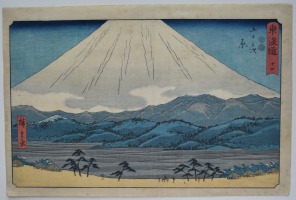
Click here to view image full size.
Hara from The Fifty-three Stations of the Tokaido published by Marusei, Maruya Seijiro, 1847-52. Called the Reisho Tokaido because of the angular style of Kanji used. Shows Fuji towering over the landscape with miniscule figures on the road at the bottom. One of the best designs from the set.
Fine impression and colour. Very slight centre fold, otherwise very good condition. Signed Hiroshige ga.
Status: Sold
Ichiryusai HIROSHIGE (1797-1858)
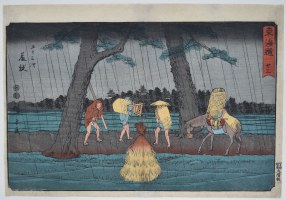
Click here to view image full size.
Fujieda from The Fifty-three Stations of the Tokaido published by Marusei, Maruya Seijiro, 1847-52. Called the Reisho Tokaido because of the angular style of Kanji used. Travellers huddled against the rain on a narrow path. One of the best designs from the set.
Fine impression and colour. Very good condition. Signed Hiroshige ga.
Status: Sold
Utagawa HIROSHIGE (1797-1858) and Utagawa KUNISADA (1786-1864)
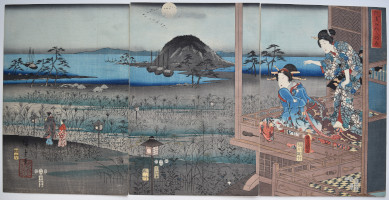
Click here to view image full size.
A triptych from a set: Furyu Genji: Akashi. An evening scene showing Genji’s secret lover Lady Fujitsubo and an attendant watching the departing Prince Genji walking through the reeds of Akashi Bay. Based on the famous Genji monogatari written by the 11th century noblewoman and lady-in-waiting Murasaki Shikibu. Published by Iseya Kanekichi 1853.
Fine impression. This is the early state with gradation over the moon. Fine colour. Very slight trimming and retains album backing, otherwise very good condition. Signed Hiroshige ga and Toyokuni ga.
Status: Sold
Utagawa KUNIYOSHI (1797-1861)
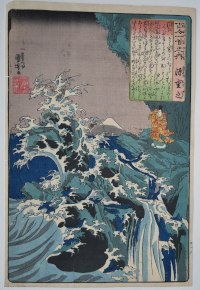
Click here to view image full size.
A poem by the celebrated poet Minamoto no Shigeyuki from the series Hyakunin isshu no uchi, “One Hundred Poems for One Hundred Poets” which was compiled in 1235 by Fujiwara Teika (1162-1241). Shows the poet on a craggy outcrop with waves crashing around him; Fuji in the distance. One of the best designs in the set published by Ebisuya Shoshichi, Ebine, 1840-42. Only 58 of the 100 are known. Various translations of the poem exist, here is one:
Waves that beat against the rocks
Fanned by a fierce wind –
It is I alone
Who breaks, those times
When I think of her
Very fine impression. Fine colour and condition. Signed Ichiyusai Kuniyoshi ga. Hiroshige ga.
Status: Sold
Utagawa HIROSHIGE (1797-1858)
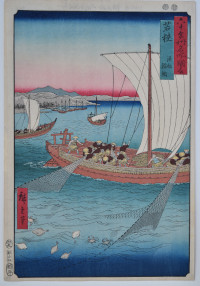
Click here to view image full size.
Wakasa, Gyosen karei-ami, “Fishing Boats and Flounder Nets in Wakasa [Province]” from a set of 69 prints [Dai Nihon] Rokujuyoshi meisho zue, “Famous Places in the Sixty-odd Provinces [of Japan]” published by Koshihei between 1853 and 1856, this being 1853. Fishing in Wakasa Bay. The highway between the Wakasa ports and Kyoto was nicknamed the “Mackerel Highway” because of the quantity of fish that was transported.
Very fine impression and colour. Light album backing, otherwise fine condition. Signed Hiroshige ga.
Status: Sold
Utagawa HIROSHIGE (1797-1858)
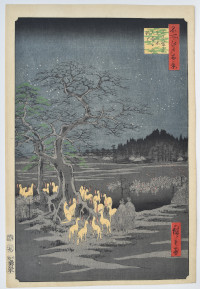
Click here to view image full size.
Oji Shozoku enoki, Omisoka no kitsunebi, “Foxfires on New Year’s Eve at the Shozoku Hackberry Tree, Oji,” from Meisho Edo hyakkei, “The One Hundred Famous Views of Edo,” published by Uoya Eikichi 1856-58 (this being 1857). This is the only design from the set where Hiroshige uses historical fantasy: Every New Year’s Eve foxes gathered at the ancient enoki tree to pay their respects to their fox patron in the nearby Inari shrine at Oji, in northern Edo. The shrine was dedicated to the god of the harvests and farmers would predict the outcome of a harvest by the amount of kitsunebi (fox flames) they saw emitted by the foxes. A popular print from the set.
Very good impression, colour and condition. Signed Hiroshige ga.
Status: Sold
Utagawa HIROSHIGE (1797-1858)
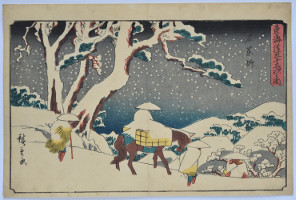
Click here to view image full size.
Ishiyakushi from an aiban set Tokaido gojusantsugi no uchi, commonly called the Gyosho Tokaido because of the cursive script on title. Shows travellers entering and leaving the village in heavy snow. Published by Ezakiya Kichibei/Yamadaya, c. 1841-2. There are variant states: later editions lack the gradation on the horizon. The first state may have a Hiroshige seal after the signature.
Very good impression and colour. Slight centre fold, otherwise very good condition. Signed Hiroshige ga.
Status: Sold
Kikukawa EIZAN (1787-1867)
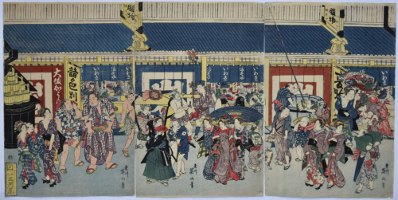
Click here to view image full size.
A triptych showing a street thronged with people in front of the famous department store Iwaki Masuya, giving a good cross-section of the inhabitants of the city at this time. The store specialised in silk and textiles and was one of the most important in Edo having, at one point, 500 employees in its stores. Hiroshige designed another triptych of this subject in c. 1850.
Published by Mikawaya Seiemon, c. 1815. Rare.
Fine impression. Extremely fine fresh colour. Fine condition. Full size. Signed Kikukawa Eizan fude.
Status: Sold
Utagawa HIROSHIGE (1797-1858)
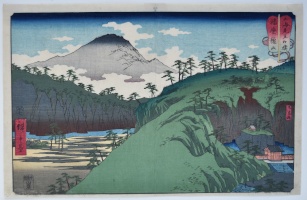
Click here to view image full size.
Harima Tatsuyama, “Mount Tatsu [Dragon] in Harima [Province]” from a set of twenty prints Sankai mitate zumo, “Wrestling Matches Between Mountains and Sea.” A fanciful and imaginative title lacking in other Hiroshige sets. Comprises of ten prints of mountains and ten prints of harbours. Published by Yamadaya Shojiro, 1858. The title is in a wrestling umpire’s fan (gunbai).
Very fine impression of the first edition. Later printings have a solid red in the title cartouche instead of variegated colour and lack other subtleties. Fine colour. Very slight centre fold and minimal soil bottom left margin, otherwise very good condition. Signed Hiroshige ga. Hiroshige ga.
Status: Sold
Utagawa HIROSHIGE (1797-1858)
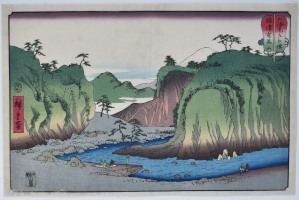
Click here to view image full size.
Settsu Arimayama, “Mount Arima in Settsu [Province]” from a set of twenty prints Sankai mitate zumo, “Wrestling Matches Between Mountains and Sea.” A fanciful and imaginative title lacking in other Hiroshige sets. Comprises of ten prints of mountains and ten prints of harbours. Published by Yamadaya Shojiro, 1858. The title is in a wrestling umpire’s fan (gunbai).
Very fine impression of the first edition. Later printings have a solid red in the title cartouche instead of variegated colour and lack other subtleties. Fine colour. Very slight centre fold and minimal soil bottom left margin, otherwise very good condition. Signed Hiroshige ga.
Status: Sold
Utagawa HIROSHIGE (1797-1858)
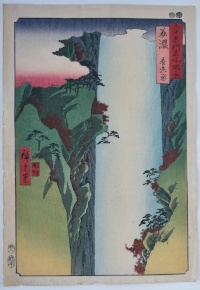
Click here to view image full size.
Mino, Yoro no taki, “Mino [Province], Yoro Waterfall” The 32 metre fall is 4 metres wide and is located in Yoro Park, near Nagoya. From a set of 69 prints [Dai Nihon] Rokujuyoshi meisho zue, “Famous Places in the Sixty-odd Provinces [of Japan]” published by Koshimuraya Heisuke between 1853 and 1856, this being 1853.
Fine, very early impression with extensive blind-printing on the fall. Fine colour. Some wrinkling of the large margins, otherwise very good condition. Signed Hiroshige ga.
Status: Sold

